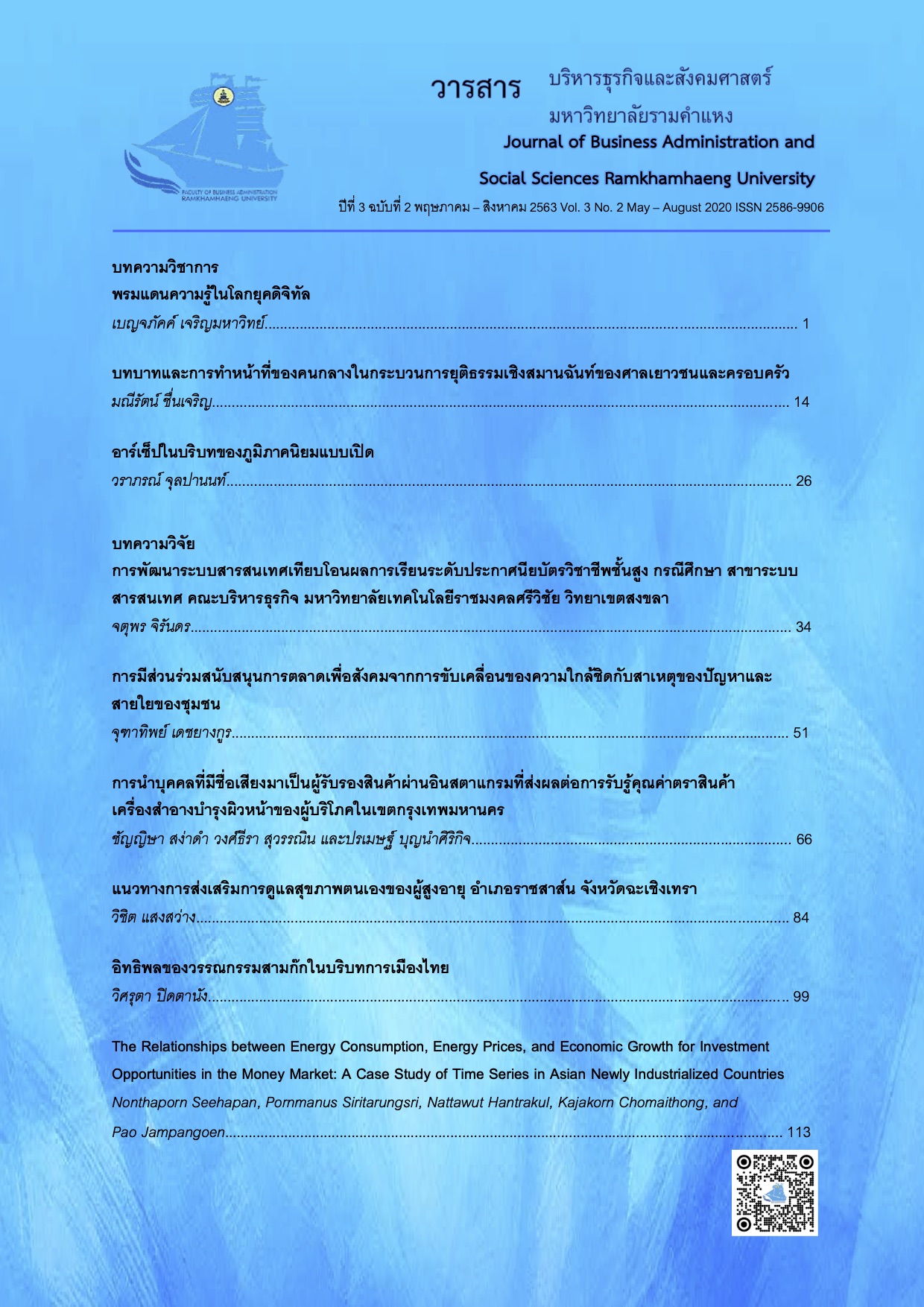The Relationships between Energy Consumption, Energy Prices, and Economic Growth for Investment Opportunities in the Money Market: A Case Study of Time Series in Asian Newly Industrialized Countries
Main Article Content
Abstract
In this research investigation, the researchers study the causal relationships between energy consumption, energy prices, and income in six Asian newly industrialized countries i.e. India, Indonesia, Malaysia, the Philippines, Thailand, and China using the techniques of cointegration and an error-correction model. The Granger causality model found that India exhibited the short-run bidirectional causality relationship between energy consumption and income and the short-run unidirectional causality relationship with energy prices which were the cause of energy consumption. In regard to cointegration, energy consumption and energy prices were the causes of income in India and Indonesia. In Malaysia and the Philippines, the test showed that income and energy consumption were the causes of energy prices. In Thailand, energy consumption was the cause of energy prices. Therefore, energy prices and energy consumption were not the causes of income in Malaysia, the Philippines, and Thailand. These countries could use an energy conservation policy or promote the use of renewable energy without having an effect on their national incomes.
Article Details
เนื้อหาและข้อมูลในบทความที่ลงตีพิมพ์ในวารสารบริหารธุรกิจและสังคมศาสตร์ มหาวิทยาลัยรามคำแหง ถือเป็นข้อคิดเห็นและความรับผิดชอบของผู้เขียนบทความโดยตรง ซึ่งกองบรรณาธิการไม่จำเป็นต้องเห็นด้วย หรือร่วมรับผิดชอบใดๆ
บทความ ข้อมูล เนื้อหา รูปภาพ ฯลฯ ที่ได้รับการตีพิมพ์ในวารสารบริหารธุรกิจและสังคมศาสตร์ มหาวิทยาลัยรามคำแหง ถือเป็นลิขสิทธิ์ของวารสารบริหารธุรกิจและสังคมศาสตร์ มหาวิทยาลัยรามคำแหง หากบุคคลหรือหน่วยงานใดต้องการนำบทความทั้งหมดหรือส่วนหนึ่งส่วนใดไปเผยแพร่ต่อ หรือเพื่อกระทำการใดๆ จะต้องได้รับอนุญาตเป็นลายลักษณ์อักษรจากวารสารบริหารธุรกิจและสังคมศาสตร์ มหาวิทยาลัยรามคำแหง ก่อนเท่านั้น
References
Akarca, A. T., & Long II, T. V. (1979). Energy and employment: a time series analysis of the causal relationship. Resources Energy, 2(2-3), 151-162.
Akarca, A. T., & Long II, T. V. (1980). On the relationship between energy and GNP: a re-examination. The Journal of Energy and Development, 5(2), 326-331.
Belke, A., Dobnik, F., & Dreger, C. (2011). Energy consumption and economic growth: New insights into the cointegration relationship. Energy Economics, 33(5), 782-789.
Benkraiem, R., Lahiani, A., Miloudi, A., & Shahbaz, M. (2018). New insights into the US stock market reactions to energy price shocks. Journal of International Financial Markets, Institutions and Money, 56(C), 169-187.
Bilgili, F., Öztürk, I., Kocak, E., & Bulut, Ü. (2017). Energy consumption-youth unemployment nexus in Europe: Evidence from panel cointegration and panel causality analyses. International Journal of Energy Economics and Policy, 7(2), 193-200.
Bozyk, P. (2012). Globalization and the transformation of foreign economic policy. Ashgate Publishing, Ltd.
Dickey, D. A., & Fuller, W. A. (1981). Likelihood ratio statistics for autoregressive time series with a unitroot. Econometrica, 49(4), 1057-1072.
Engle, R. E., & Granger, C. W. J. (1981). Cointegration and error-correction: representation, estimation and testing. Econometrica, 55(2), 251-276.
Engle, R., Hendry, D. F., & Richard, J. F. (1983). Exogeneity. Econometrica: journal of the Econometric Society, 51(2), 277-304.
Erol, U., & Yu, E. S. H. (1987). Time series analysis of the causal relationships between US energy and employment. Resources Energy, 9(1), 75-89.
Erol, U., & Yu, E. S. H. (1989). On the causal relationship between energy and income for industrialized countries. The Journal of Energy and Development, 13(1), 113-122.
Fang, Z., & Chang, Y. (2016). Energy, human capital and economic growth in Asia Pacific Countries-Evidence from a panel cointegration and causality analysis. Energy Economics, 56(C), 177-184.
Ghosh, S., & Kanjilal, K. (2016). Co-movement of international crude oil price and Indian stock market: Evidences from nonlinear cointegration tests. Energy Economics, 53(C), 111-117.
Glasure, Y. U., & Lee, A. R. (1997). Cointegration, error-correction, and the relationship between GDP and energy: the case of South Korea and Singapore. Resource and Energy Economics. 20(1), 17-25.
Granger, C. W. J., (1969). Investigating causal relations by econometric models and cross spectral methods. Econometrica, 37(3), 424-438.
Guillén, M. F. (2003). Multinationals, ideology and organized labor: the limits of convergence.
Johansen, S. (1991). Estimation and hypothesis testing of cointegration vectors in Gaussian vector autoregressive models. Econometrica, 59(6) 1551-1580.
Kang, W., Ratti, R. A., & Vespignani, J. (2016). The impact of oil price shocks on the US stock market: A note on the roles of US and non-US oil production. Economics Letters, 145, 176-181.
Kraft, J., & Kraft, A., (1978). On the relationship between energy and GNP. The Journal of Energy and Development, 3(2), 401-403.
Mankiw, N. G. (2014). Principles of economics. Cengage Learning.
Newbold, P., & Granger, C. W. J. (1974). Spurious regressions in econometrics. Journal of Econometrics, 2(2), 111-120.
Phillips, P. C. B., & Perron, P. (1988). Testing for a unit root. Biometrica 75, 335-346.
Pirlogea, C., & Cicea, C. (2012). The econometric perspective of the energy consumption and economic growth relation in European Union. Renewable and Sustainable Energy Reviews, 16(8), 5718-5726.
Rafindadi, A. A., & Ilhan, O. (2017). Dynamic effects of financial development, trade openness and economic growth on energy consumption: Evidence from South Africa. International Journal of Energy Economics and Plicy, 7(3). 74-85
Sims, C. A. (1972). Money, income and causality. The American economic. Review. 62(4), 540-552.
Syzdykova, A., Azretbergenova, G., Massadikov, K., Kalymbetova, A., & Sultanov, D. (2020). Analysis of the
Relationship between Energy Consumption and Economic Growth in the Commonwealth of Independent States. International Journal of Energy Economics and Policy, 10(4), 318-324.
Waugh, D. (2000). Manufacturing industries (chapter 19), World development (chapter 22) Geography, An Integrated Approach, 563-576.
Yu, E. S. H., & Choi, J. Y. (1985). The causal relationship between energy and GNP: an International comparison. The Journal of Energy and Development, 10(2), 249-272.
Yu, E. S. H., & Hwang, B. K. (1984). The relationship between energy and GNP: further results. Energy Economics. 6(3), 186-190.
Yu, E. S. H., & Jin, J. C. (1992). Cointegration tests of energy consumption, income and employment. Resources Energy, 14(3), 259-266.
Yu, E. S. H., Chow, P. C. Y., & Choi, J. Y. (1987). The relationship between energy and employment: a re-examination. Energy Systems Policy, 11(4), 287-295.


